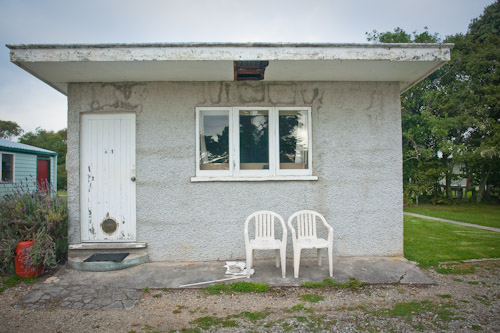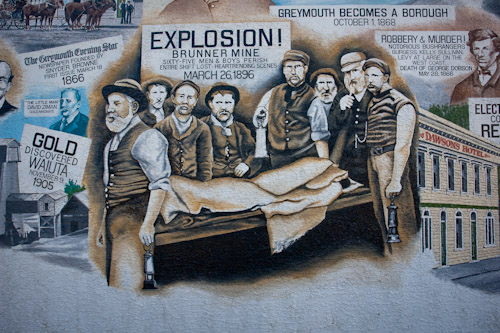|
April 14, 2009
When I was travelling in New Zealand I was inevitably engaged with my past and my cultural memory of the official history of the nation, my historical sense of growing up and working in NZ in a resource-based economy, and my personal memory of the undercurrent of morbidity and angst in an insular and authoritarian colonial informed culture.
 Gary Sauer-Thompson, cabin, caravan park, Karamea, Westland, 2009
Gary Sauer-Thompson, cabin, caravan park, Karamea, Westland, 2009
I realized that New Zealand, like Australia, had been undergoing an upsurge in memory due to a questioning of its colonial heritage as a settler society taking place. If history it had once been the case that history was the sphere of the collective and memory that of the individual, then the shift was that the emergence of the idea that memory can be collective, emancipatory and sacred turns the old meaning of the term 'memory' inside out.
 Gary Sauer-Thompson, mural, Greymouth, New Zealand, 2009
Gary Sauer-Thompson, mural, Greymouth, New Zealand, 2009
What has emerged since the 1970s are those forms of memory bound up with minority groups for whom rehabilitating their past is part and parcel of reaffirming their identity.
Pierre Nora in Reasons for the current upsurge in memory in Eurozine says that this change has taken a variety of forms: criticism of official versions of history and recovery of areas of history previously repressed; demands for signs of a past that had been confiscated or suppressed; growing interest in "roots" and genealogical research; all kinds of commemorative events and new museums; renewed sensitivity to the holding and opening of archives for public consultation; and growing attachment to what in the English-speaking world is called "heritage" .
However they are combined, these trends together make up a kind of tidal wave of memorial concerns that has broken over the world, everywhere establishing close ties between respect for the past - whether real or imaginary - and the sense of belonging, collective consciousness and individual self-awareness, memory and identity.
Nora says that we are no longer on very good terms with the past. We recover it by reconstructing it in detail with the aid of documents, photographs and archives; in other words, what we today call "memory" - a form of memory that is itself a reconstruction - is simply what was called "history" in the past.
|
